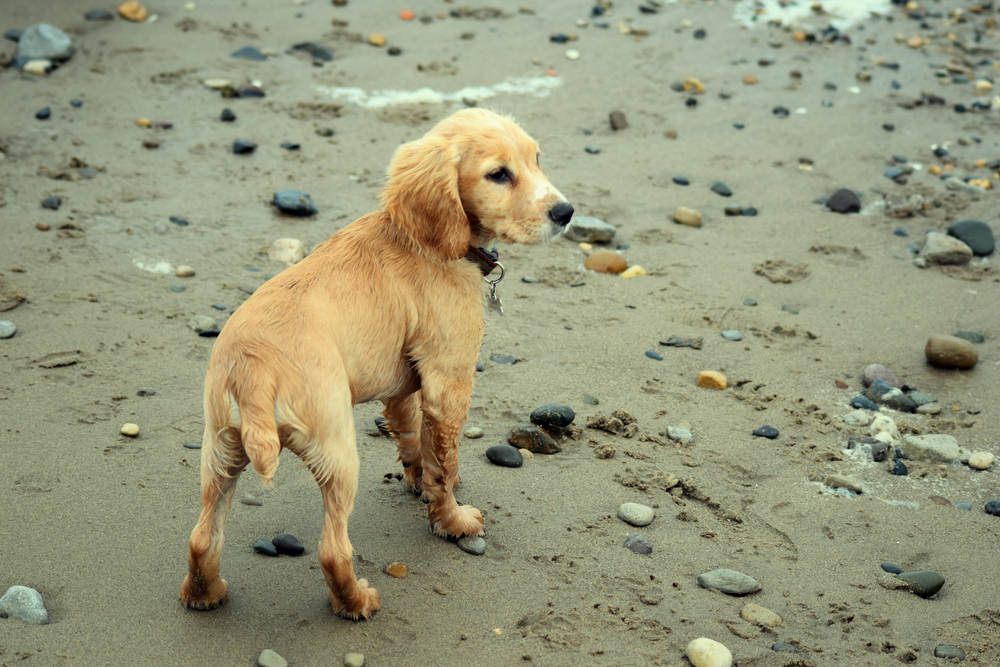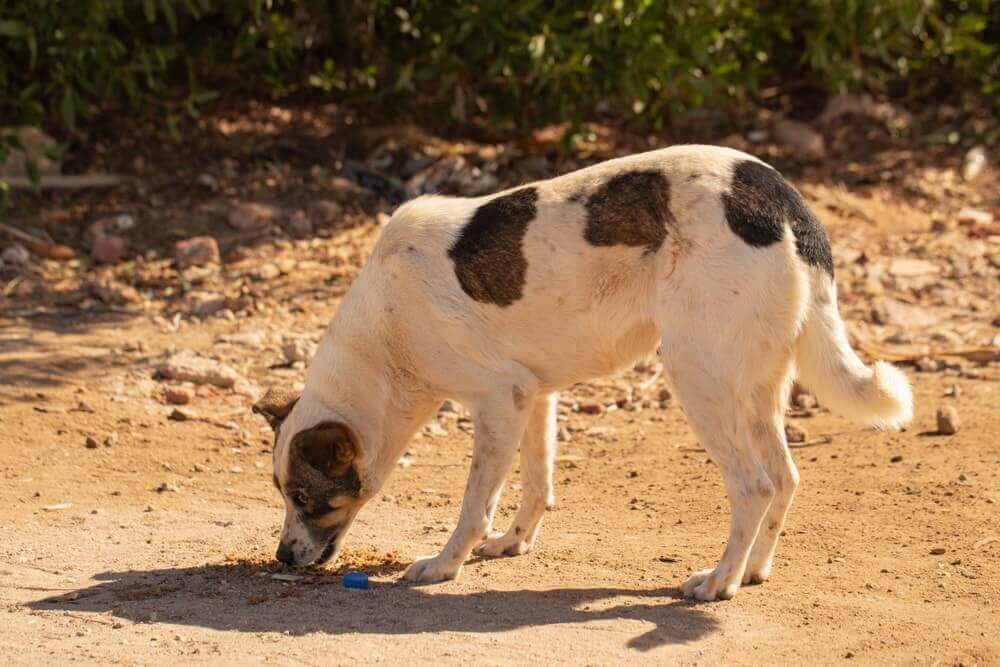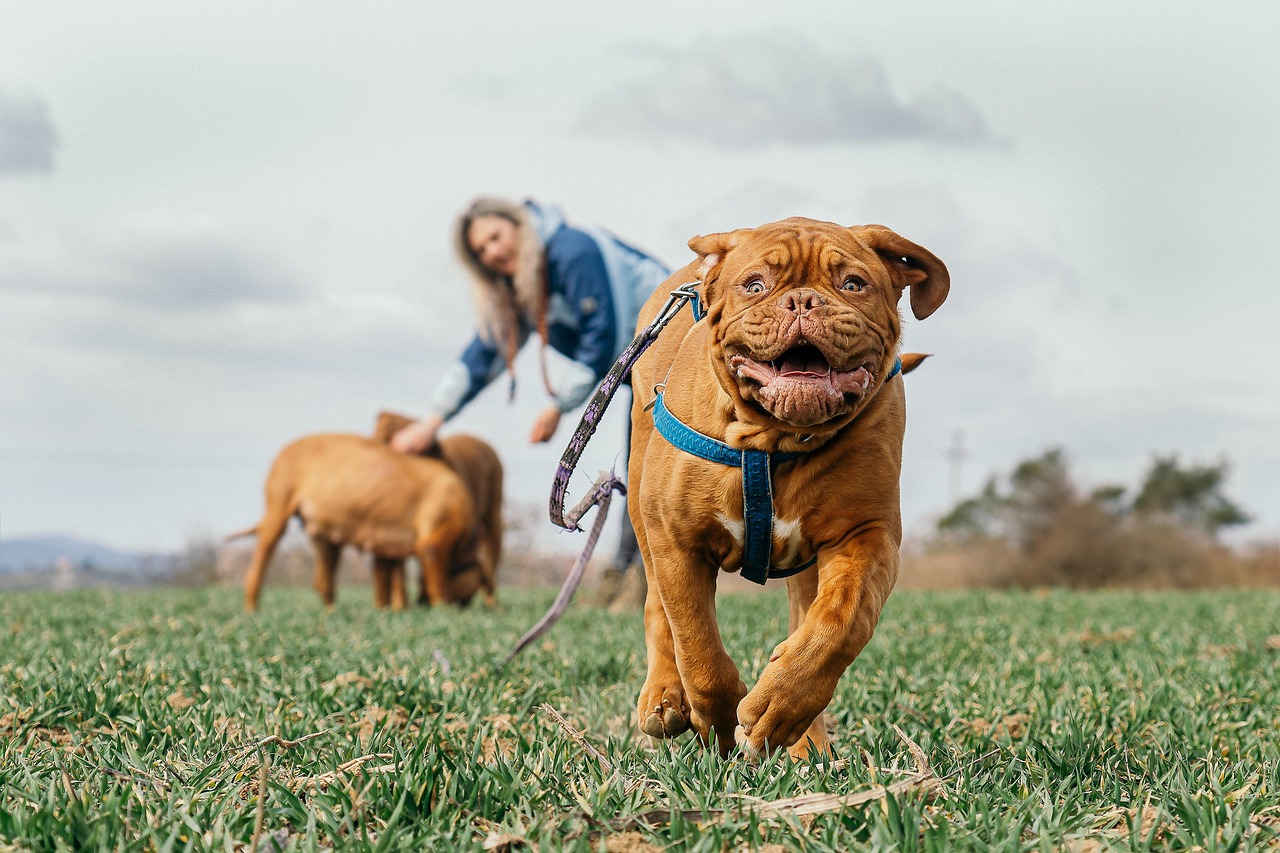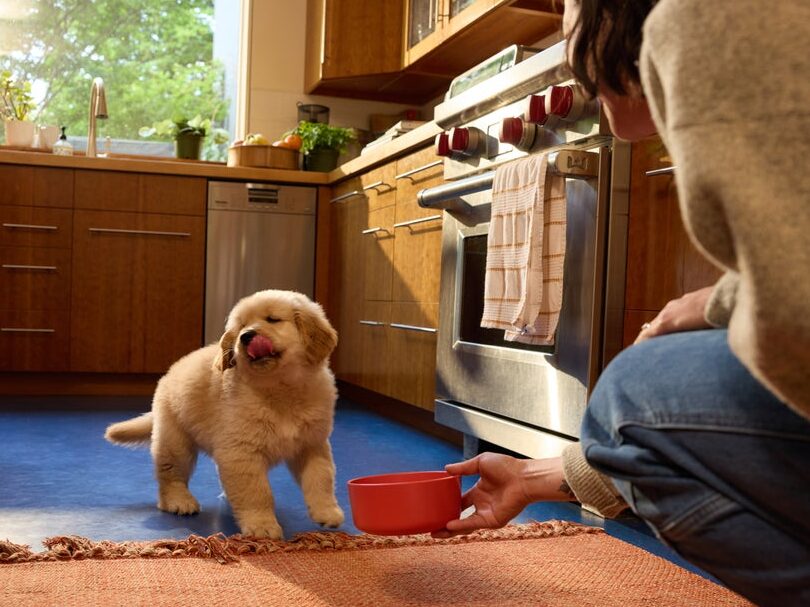Hey Ollie blog readers! We’re offering you an exclusive 60% OFF your starter box! Try now!
You fill your dog’s bowl with tasty, nutritious food, so why is your pup munching on rocks? If you’ve caught your dog or puppy eating rocks, you’re not alone. It’s a strange (and potentially dangerous) behavior many pet parents deal with. From curiosity to medical issues like pica or nutritional deficiencies, there are several reasons dogs eat rocks. In this guide, we’ll break down why your dog may be drawn to rocks, the risks of letting it continue, and how to stop the behavior before it becomes harmful.
Why Do Dogs Eat Rocks?
The most common reason your dog might be eating rocks is a medical condition called Pica. The classic signs of pica are eating non-food items. In addition to rocks, dogs with Pica might also eat dirt, trash, plastic, metal or articles of clothing like socks. There is no known cause as to why dogs get Pica, but it is often linked to nutritional deficiencies.
Another reason your dog may start eating rocks is that he or she has a behavioral issue. Stress or anxiety in your dog may manifest into your dog eating rocks. Your dog might be seeking your attention when he puts rocks in his mouth or he could be anxious or bored.
Finally, if your pet doesn’t have Pica or a behavioral issue, they may be eating rocks due to a nutritional deficiency or a parasite.
To get to the root of why your pet is eating rocks, you’ll want to start with a visit to your vet. He or she can do an exam and run diagnostic tests to check for nutritional deficiencies or parasites. They may also ask some lifestyle questions about your pet to determine if the issue is behavioral.

Common Reasons Why Your Dog Is Eating Rocks
If you’re asking, “Why is my dog eating rocks?”, there could be more than one reason. Dogs eat rocks for both behavioral and medical reasons, and understanding the root cause is the first step to solving it.
Here are the most common reasons:
1. Puppy Curiosity and Teething
Puppies explore the world with their mouths. If your puppy is teething, they may chew on rocks to relieve discomfort, just like they would with shoes or furniture.
2. Boredom or Lack of Mental Stimulation
Dogs that don’t get enough exercise or enrichment may chew or eat strange things, like rocks, just to pass the time or get attention.
3. Pica (Eating Non-Food Items)
Pica is a condition where dogs crave and consume non-edible objects. It can be linked to medical issues like anemia, digestive problems, or nutrient deficiencies.
According to the American Kennel Club, pica in dogs is often caused by an underlying medical condition or behavioral issue that requires treatment.
4. Nutritional Deficiencies
Some dogs eat rocks because they’re missing important nutrients in their diet, such as iron or fiber. This is more common in dogs eating low-quality food that doesn’t meet their nutritional needs.
5. Stress or Anxiety
Just like humans might bite their nails when anxious, some dogs chew or eat rocks when they’re feeling stressed. This could be due to changes in their environment, separation anxiety, or lack of routine.
What To Do If Your Dog Is Eating Rocks
If your dog has started eating rocks, don’t ignore it. Eating rocks can lead to serious health issues like broken teeth, intestinal blockages, or internal bleeding. Here’s what you can do to help stop it safely:
1. Visit Your Veterinarian
First, rule out medical causes. Your vet can check for nutrient deficiencies, parasites, or other underlying conditions like pica. Blood tests or stool samples may be necessary.
2. Upgrade Their Diet
If your dog’s current food isn’t meeting their nutritional needs, it could trigger strange cravings. Switching to a fresh, vet-formulated diet like Ollie can help support better health—and reduce weird snacking.
3. Supervise Outdoor Time
Keep a close eye on your dog during walks or backyard play. Use a leash to gently guide them away from gravel or rocky areas. Consider muzzling if the behavior is frequent and dangerous.
4. Offer Safe Alternatives
Redirect the behavior with dog-safe chew toys, puzzle feeders, or frozen treats—especially for teething puppies or bored dogs. Make chewing more rewarding with safe, edible options.
5. Work With a Trainer or Behaviorist
If the rock-eating seems rooted in anxiety, stress, or obsessive behavior, working with a certified dog trainer or animal behaviorist can help uncover and treat the cause.
Risks associated with dogs eating rocks
Eating rocks is not a safe behavior for your dog for many reasons. It can lead to illnesses or injuries that result in the need for costly surgery or medical care.
- Intestinal blockages
If your pet ingests a large enough rock, it can cause a blockage that will require surgery to remove. Intestinal blockages prevent dogs from getting adequate nutrition and can cause your pet to vomit or become lethargic. If you think your dog has swallowed something and it is causing a blockage, see your vet immediately to confirm with an X-ray and have it removed.
- Perforated stomach or colon
Sharp rocks can cause perforation as they pass through your pet’s digestive tract. If your dog is in pain or showing any signs of perforation you will want to take them to the vet for treatment.
- Chipped or broken teeth
If your pet is chewing on hard stones or rocks they can chip or damage their teeth, resulting in the need for dental work or even having an impacted tooth removed. Dog dental work is done under anesthesia and therefore poses some additional risks.
- Upset Stomach
Even small pebbles can irritate your dog’s stomach. They can experience vomiting or diarrhea even if they’ve only eaten a few pebbles.

How to stop your dog from eating rocks
- Avoid areas with gravel or significant amounts of rocks
If your dog isn’t around rocks, he can’t eat them. If you know your dog can’t resist you might want to avoid or eliminate the temptation. Try changing where you walk your dog. If you are in a city, seek out dog parks that don’t have gravel so your dog can’t eat it. You can also look for dog training facilities that allow you to rent space to exercise your dog indoors in extreme instances.
- Use behavior modification
Offer your dog an alternative like a favorite treat or a tug toy for dropping the rock. By positively reinforcing the behavior of not eating rocks you may be able to eliminate your dog’s desire to do so.
- Ensure nutritional deficiencies are addressed and treat any parasitic infections
Should your vet determine that a nutritional deficiency or parasite is the reason that your pet may be eating rocks, you’ll want to work with him or her on a treatment plan. This could include adding nutritional supplements to your pup’s food and/or medication to treat any parasitic infection.
- Offer opportunities for exercise and mental stimulation
Once you have ruled out nutritional deficiencies or infection and have determined that your dog is eating rocks due to a behavioral issue, you’ll want to make sure that your dog is getting ample exercise and mental stimulation. For some breeds of working dogs, leash walks are not enough mental stimulation. You can add training exercises or even give them puzzle toys to help stimulate their minds. Some dogs even enjoy learning tricks or tasks around your house. You may wish to consult a trainer, especially if your dog is a working or herding breed like a Border Collie or Husky.
- Give your dog ample amounts of attention
Similar to ensuring your dog has enough physical and mental exercise, if eating rocks is a behavioral issue, you will also want to ensure that your dog is getting enough attention. If they are eating rocks to get attention from you, being proactive with your attention may lessen their desire to eat rocks in the first place.
Once you have determined why your pet is eating rocks in the first place you’ll be able to put a plan in place to help them stop. It might take some time and patience on your end, as change does not happen overnight, especially with dogs. By ensuring your dog is getting adequate nutrition, providing physical and mental exercise, attention and opportunities for behavior modification you will be helping them live their happiest and healthiest lives.
Frequently Asked Questions About Dogs Eating Rocks
Why does my dog keep eating rocks?
Dogs may eat rocks due to boredom, curiosity, anxiety, or a condition called pica, which causes them to crave non-food items. Nutritional deficiencies and teething in puppies are also common causes. If the behavior continues, talk to your vet to rule out medical issues.
Is it dangerous for dogs to eat rocks?
Yes. Eating rocks can lead to serious health risks including broken teeth, choking, digestive blockages, internal injuries, or even surgery. If your dog has swallowed a rock or shows signs of pain, vomiting, or lethargy, contact your veterinarian immediately.
Why is my puppy eating rocks?
Puppies often eat rocks while teething or exploring. They’re naturally curious and may chew on rocks for comfort. Always supervise your puppy outside and redirect their attention with safe chew toys or frozen treats.
Can a dog pass a small rock naturally?
Sometimes. Small, smooth rocks may pass through a dog’s digestive system without issue, but there’s always a risk of blockage or internal damage. If you suspect your dog ate a rock, monitor them closely and contact your vet if symptoms develop.
How do I stop my dog from eating rocks?
Start by ruling out medical causes with a vet visit. Then focus on redirecting the behavior with safe chew toys, mental stimulation, exercise, and a nutritious diet. Training and positive reinforcement can also help correct the habit long-term.
Is my dog eating rocks because of a nutritional deficiency?
Possibly. Dogs that eat rocks may be missing key nutrients like iron, fiber, or minerals. Feeding a complete, vet-approved diet like Ollie’s fresh food recipes can help support better health and reduce strange cravings.
Should I be worried if my dog eats gravel or small stones?
Yes. Even small stones can cause dental damage or gastrointestinal problems. Eating gravel may also be a sign of boredom, stress, or an underlying health issue. It’s best to consult with your vet and take steps to prevent access.
The Ollie blog is devoted to helping pet parents lead healthier lives with their pups. If you want to learn more about our fresh, human-grade food, check out MyOllie.com.
Tagged As:

The nutrition your dog needs,
the food they want.

Enjoying our articles? Subscribe our Newsletters and get new articles directly to your inbox
You might also like
23 September 2025
6 MINS READ
Back to School: Training Your Dog at Any Age
As we hit back-to-school season rolls around, it’s not just kids who benefit from sharpening their skills and learning something new—our dogs can, too! Training isn’t limited to puppies or p…
by Ollie Pets
23 September 2025
7 MINS READ
Lace Up and Leash Up: A Beginner’s Guide to Running with Your Dog
Running is one of the simplest ways to stay active, and it’s even better with a canine companion. Not only does running with your dog keep you both in great shape, it also strengthens your bond …
by Ollie Pets
13 May 2025
8 MINS READ
Puppy Training Guide & Behavior Timeline
Bringing home a puppy is pure magic. It’s also pure chaos—tiny teeth, zoomies, accidents in the house, and moments that make you wonder if you’re raising a future genius or a tiny tornado. …
by Ollie Pets







